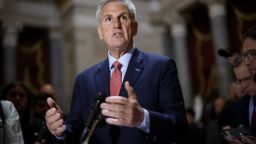Editor’s note:?Dean Obeidallah, a former attorney, is the host of SiriusXM radio’s daily program “The Dean Obeidallah Show.” Follow him?@[email protected]. The opinions expressed in this commentary are his own. Read?more opinion?at CNN.

Within hours of Saturday night’s?announcement?that GOP congressional leaders and the White House had reached an agreement in principle?to raise the debt ceiling, President Joe Biden released a?statement?addressing what he expected would be pushback from some — including fellow Democrats — to the proposed deal. The?president wrote: “The agreement represents a compromise, which means not everyone gets what they want.” He added, “That’s the responsibility of governing.”
What we know from the reporting so far is that the deal was truly a compromise from the extreme demands that the House GOP laid out in a bill it?passed?last month.
That legislation?called for massive budget cuts to domestic programs?over 10 years, blocking Biden’s student loan relief program and more — all in return for raising the debt ceiling for one year.
But the?proposed deal?raises the debt ceiling for two years. During the 2024 presidential election, the House GOP can’t hold our economy hostage in exchange for massive cuts — or cause a default that would be horrific for?the economy?but could be perceived as good for the Republican presidential candidate. In addition, the new restraints on federal spending agreed to — according to a?New York Times?analysis Sunday — while noteworthy, amount to only “a fraction of the cuts Republicans originally sought.”
In addition, Biden’s student loan relief program (awaiting?a Supreme Court ruling) remains. The deal would increase work requirements for some recipients — temporarily — as demanded by the GOP for certain federal programs, but at the same time?it would expand?food stamp benefits for veterans and the homeless.
Now congressional leaders in both parties?must convince their members?to vote for the agreement in the House and Senate.?Treasury Secretary Janet Yellen?warned last week that the US government will run out of funds to pay its bills in full and on time by June 5 unless Congress raises?the debt ceiling.
In remarks Sunday evening from the White House,?Biden urged Congress?to pass the tentative debt limit deal.?He hailed?the agreement, saying?it “prevents the worst possible crisis — a default for the first time in our nation’s history.”
Biden is right about not everyone is getting what they want. While the exact details of the proposed deal are being drafted, Democratic Rep. Pramila Jayapal of Washington, chair of the Congressional Progressive Caucus,?said?on CNN on Sunday morning that the White House does “have to worry” that progressive Democrats may not support the agreement. Jayapal, however, added that until lawmakers see “the exact legislative text,” it’s unclear how much opposition there will be. The text of the package?was set to be finalized?Sunday.
On the Republican side, far-right members of the House did not even wait for the text before?slamming?the proposal and House Speaker Kevin McCarthy for agreeing to it. For example, GOP Rep. Bob Good of Virginia?tweeted, “No one claiming to be a conservative could justify a YES vote.”
But to all my fellow Democrats unhappy with this compromise, there is an easy fix: Win back control of the House in 2024 — while retaining the Senate and White House — and they can roll back any parts of the deal they find objectionable.
Taking back the House is within reach, given that the GOP has a?slim five-seat majority?and?18 House Republicans?represent districts that Biden won in 2020. Just last month, the Democratic Congressional Campaign Committee?announced?an aggressive plan to flip 31 House seats from red to blue in 2024.
Many Democrats,?including?myself, have implored Biden to use the untested yet legally plausible approach of invoking Section 4 of the 14th?Amendment to avoid?a catastrophic default by authorizing the Treasury Department to pay bills above the debt limit.
But it became clear last week that Biden considered these negotiations no longer focused on solely raising the debt ceiling.
As the president?said?Thursday, “I want to be clear that the negotiations were happening with Speaker McCarthy is about the outlines of what the budget will look like, not about default.” He added, “It’s about competing visions for America. … Speaker McCarthy and I have a very different view of who should bear the burden of additional efforts to get our fiscal house in order.”
Get Our Free Weekly Newsletter
- Sign up for CNN Opinion’s newsletter
- Join us on Twitter and Facebook
While some may view his stance as semantics, Biden was telling us that he was eyeing a broader budget deal. Typically, those are negotiated near the end of the year and — as we have lived through — can result in?government shutdowns?if a budget impasse occurs.
Republicans control the House — the chamber where all spending bills originate as mandated by?Article 1 of the Constitution. That doesn’t mean Democrats can’t be unhappy — it just means the only way to reach what is in essence a budget deal for the upcoming year was compromise with the GOP. (Until we see the text of the deal, we won’t know how detailed the agreement is regarding the budget beyond the?agreed-upon spending limits.)
Of course, Democrats could win back the House — plus retain the White House and Senate — and still not everything most of them support will become law. We saw that scenario play out in 2022 when Democratic Sen. Joe Manchin of West Virginia?blocked?Biden’s sweeping?Build Back Better proposal?to expand the social safety net.
However, winning elections is the best way to effectuate change — including rolling back any compromises in this deal that the Democratic base doesn’t support. And the best part is that the 2024 election is only a little over a year away.


